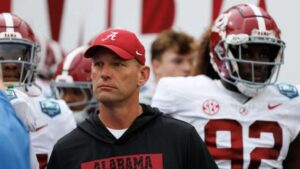
Auburn’s Bruce Pearl: A Vocal Leader of a Trio of Jewish Coaches
Bruce Pearl, the dynamic head coach of Auburn University’s basketball team, has not only achieved tremendous success on the court but also serves as a significant figure in the broader basketball community, particularly within the Jewish community. Known for his energetic personality, strategic acumen, and sometimes controversial coaching style, Pearl stands out in a field where Jewish representation is relatively rare. As a vocal leader of a trio of Jewish coaches, Pearl exemplifies how sports can transcend religious and cultural boundaries, becoming a platform for both personal expression and communal pride.
In this essay, we will explore the life of Bruce Pearl, his journey through the world of basketball, the context of Jewish representation in the sport, and how Pearl has become a figurehead for a group of Jewish coaches, including his relationships with others in the same community. Through his leadership on and off the court, Pearl’s story is a testament to resilience, dedication, and the power of identity in shaping one’s legacy.
Early Life and Jewish Identity
Bruce Pearl was born on March 18, 1960, in Boston, Massachusetts, to Jewish parents, but his upbringing in a suburban community of Massachusetts didn’t emphasize Jewish traditions as much as it could have. His Jewish identity was an important part of his upbringing, but not the singular defining factor of his early years. He attended a synagogue, but sports, particularly basketball, were what captured his attention. Pearl’s early affinity for basketball eventually became the driving force of his life, but it was his Jewish heritage that provided the foundational values and work ethic that would later inform his coaching style.
Growing up in the 1960s and 1970s, Bruce Pearl lived in an environment where Jewish athletes were few and far between, particularly in the arena of high-level basketball. Despite the lack of prominent Jewish role models in the professional basketball world, Pearl’s journey through basketball would break the mold of his predecessors. Even as his career progressed, the idea of representing Jewish identity was not one he would often articulate in public. It wasn’t until later in life that he would embrace this aspect of himself more fully and become a vocal leader within a community of Jewish coaches in college basketball.
College Basketball Career
Bruce Pearl’s basketball career began at Boston College, where he played for the Eagles under head coach Gary Williams in the late 1970s. Pearl didn’t make a huge impact as a player but was known for his work ethic, discipline, and basketball IQ. Though he was not destined for a long professional career, Pearl’s time at Boston College proved formative in shaping his future career. While his playing days were limited, Pearl’s understanding of the game, his passion for basketball, and his understanding of the importance of coaching quickly became evident.
Pearl’s coaching career began shortly after his playing days ended. After earning his degree in education from Boston College, he moved on to coaching, initially taking assistant roles at various colleges. But his rise to prominence as a head coach was not immediate; it was a slow but steady process, with a number of stops along the way. By the time he took over as head coach at the University of Tennessee in 2005, Pearl was well-prepared, both strategically and personally, for the challenges that lay ahead.
Bruce Pearl’s Coaching Philosophy and Career
When Bruce Pearl took over the University of Tennessee basketball program, it was in disarray. The Volunteers had not had a winning season in several years, and they were struggling to maintain any consistent level of competitiveness in the Southeastern Conference (SEC). However, in less than three seasons, Pearl transformed Tennessee into a national powerhouse, leading the Volunteers to an NCAA Tournament Sweet Sixteen appearance and creating a national buzz around the program.
Pearl’s signature style, characterized by high-energy play, intense full-court press defense, and an emphasis on conditioning, made him a standout figure in college basketball. He built Tennessee into a perennial powerhouse in the SEC, and his reputation as a coach who could revitalize a struggling program was cemented. His success at Tennessee was no accident; it was a direct result of his meticulous approach to recruiting, game preparation, and his ability to relate to players. These attributes, along with his enthusiastic and magnetic personality, helped him forge strong relationships with his players, even when the spotlight wasn’t on him.
However, despite his success on the court, Pearl’s coaching career has not been without its controversies. In 2011, he was involved in an NCAA recruiting scandal that led to his eventual firing from Tennessee. While the incident cast a shadow over his career, it did not define him. Instead, Pearl used the setback as an opportunity for growth, reflection, and reinvention. His eventual return to the SEC with Auburn University in 2014 marked the beginning of a new chapter for both Pearl and the Auburn program.
At Auburn, Pearl would go on to become one of the most successful and beloved coaches in the history of the program. His impact on Auburn basketball was immeasurable, turning the Tigers into consistent contenders in the SEC and leading them to a Final Four appearance in 2019. Pearl’s success with Auburn was a result of his ability to recruit top-tier talent and his ability to develop players, particularly on the offensive end.
Throughout his career, Pearl’s coaching philosophy has emphasized the importance of relationships—both on the court and off. His ability to connect with players, staff, and fans alike has made him a beloved figure in the college basketball world. His leadership style, marked by an infectious enthusiasm for the game, has inspired not only his teams but also fellow coaches, especially those from the Jewish community.
Jewish Coaches in College Basketball
Jewish representation in college basketball is relatively rare. While the NBA has seen notable Jewish players such as Dolph Schayes, Ernie Grunfeld, and Danny Schayes, the college basketball landscape has not been as diverse in terms of Jewish representation. In fact, Bruce Pearl stands out as one of the few Jewish head coaches in college basketball, and his rise to prominence has made him a trailblazer for future generations of Jewish coaches.
In addition to Pearl, two other Jewish coaches have become well-known figures in the college basketball world: David Blatt and Larry Brown. David Blatt, originally from Massachusetts, had a distinguished career in Europe before making a brief but notable foray into the NBA as the head coach of the Cleveland Cavaliers. His coaching career is a testament to the international nature of basketball and the success that Jewish coaches can achieve on the global stage.
Larry Brown, another Jewish coach, has had a storied career in college basketball, most notably as the head coach of the University of Kansas and later in the NBA with the Detroit Pistons. Brown’s influence on the game is undeniable, as he is one of the most respected figures in basketball history. Despite his Jewish background, Brown’s religion was not a central aspect of his identity in the basketball world. However, his contributions to the sport have paved the way for future generations of Jewish coaches.
Bruce Pearl stands as a leader of this group, serving as a vocal advocate for Jewish representation in college basketball. His prominence in the sport has inspired other Jewish coaches to pursue careers in coaching and has created a sense of community among Jewish basketball coaches. Pearl’s embrace of his Jewish identity, particularly in the public eye, has helped to raise awareness about the importance of diversity in college basketball and the value of fostering an inclusive atmosphere within the sport.
The Role of Bruce Pearl as a Leader for Jewish Coaches
Bruce Pearl’s significance in the Jewish basketball community cannot be understated. While his success as a coach has been remarkable, his role as a mentor and leader for other Jewish coaches is equally important. Pearl’s ability to navigate the challenges of the coaching profession while remaining true to his identity has made him an invaluable figure within the Jewish sports world.
Pearl has been vocal about the importance of embracing one’s heritage and using it as a source of strength. In interviews and public appearances, he has discussed how his Jewish upbringing influenced his approach to coaching, particularly in terms of work ethic, discipline, and community. These values, which are deeply rooted in Jewish tradition, have helped shape Pearl into the respected coach he is today.
As a mentor to other Jewish coaches, Pearl has played an integral role in fostering a sense of camaraderie and support within the community. He has openly supported up-and-coming Jewish coaches, offering guidance and encouragement as they navigate the often-challenging world of college basketball. In this way, Pearl has become a leader not only for his team at Auburn but also for the broader community of Jewish basketball coaches.
Bruce Pearl’s journey from a young Jewish athlete to one of the most successful and beloved coaches in college basketball is a testament to his determination, resilience, and passion for the game. As a vocal leader of a trio of Jewish coaches, Pearl has embraced his heritage and used it as a source of strength throughout his career. His success on the court, his impact on his players, and his leadership within the Jewish coaching community have made him a trailblazer and a source of inspiration for future generations of Jewish coaches.
In the broader context of college basketball, Pearl’s role as a Jewish coach has been invaluable in highlighting the importance of diversity and inclusion within the sport. His success has proven that talent, hard work, and leadership can transcend cultural and religious boundaries, and his legacy as a coach and leader will continue to inspire athletes and coaches alike for years to come.





